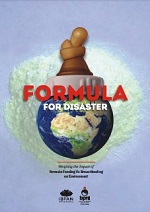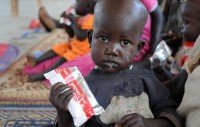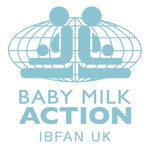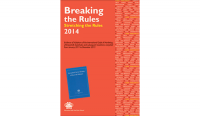
Maternity Protection Legislation Worldwide
Working document, based on ILO database on Maternity Protection, sorted region by region and country by country

Working document, based on ILO database on Maternity Protection, sorted region by region and country by country

Contributions to the legal building blocks of the Treaty regarding the scope, the state duty to protect and direct obligations for corporations
By Friends of the Earth Europe, Brot für die Welt (Social Service Agency of the Protestant Church in Germany), SOMO (Centre for Research on Multinational Corporations), CIDSE (International Alliance of Catholic Development Agencies), IBFAN (International Baby Food Action Network), IBFAN-GIFA (Geneva Infant Feeding Association), Global Policy Forum

FIAN International and IBFAN’s joint input towards the elaboration of the General Comment on the Rights of Adolescents of the Committee on the Rights of the Child (March 2015). This contribution seeks to provide information and recommendations about the right to adequate food and nutrition of adolescents and related rights (e.g. the right to health, the […]

BPNI / IBFAN Asia’s latest publication “Formula for Disaster: weighing the impact of formula feeding Vs breastfeeding on environment” is out now. The path breaking publication aims to raise awareness of the positive impact of breastfeeding on our environment and throws light on the negative impact of formula feeding. This publication positions formula feeding as […]

Globally, about 50 million children less than 5 years are wasted (too thin) at any one time; of these, over 17 million are severely wasted. These children are at high risk of death or may suffer from diseases and complications that will greatly affect their future life. Much more common is stunting (failure to achieve […]

Enshrined in the article 24 of the Convention on the Rights of the Child, breastfeeding is protected against undermining marketing practices by the International Code of Marketing of Breastmilk Substitutes. However, the misconduct of baby food companies continues to be a key cause for poor breastfeeding practices. Recently, the report Breaking the Rules 2014 highlighted the new trend […]

Baby Milk Action, a campaign group that monitors the baby food industry against United Nations marketing standards, says it has received a letter (dated 9 July 2014) from the Executive Director of the UN Global Compact, Mr Georg Kell, that confirms its view that the corporate accountability initiative is ‘worse than useless and lacking in integrity’. Link […]

This working paper gives an overview of the debate from the early efforts to formulate the UN Code of Conduct to the current initiative for a binding Treaty on Business and Human Rights. It particularly focuses on the responses by TNCs and their leading interest groups to the various UN initiatives, specifies the key actors and their objectives, and describes how many of their demands were ultimately reflected in governmental positions and UN decisions. The working paper ends with remarks on what could be done to counteract and reverse corporate influence on the UN human rights agenda.

Infant and children mortality is still a major concern globally. Breastfeeding has proven to be one of the most effective, low-cost interventions to save children’s lives. In order to protect breastfeeding, in 1981, the World Health Assembly (WHA) adopted the International Code of Marketing of Breastmilk Substitutes (the Code), to date completed and extended by fifteen subsequent relevant WHA resolutions. The Code aims to ensure that parents can make fully informed decisions about infant and young child feeding by banning marketing practices that undermine breastfeeding. […] However, since 1981, only 35 countries have fully implemented the Code. In absence of effective marketing regulation, and notwithstanding their obligation under human rights law, baby food companies are systematically violating the Code provisions by malevolent marketing practices and tactics that mislead consumers and health professionals. […]

The new ‘Breaking the Rules 2014’ BTR report, published in January 2014 by IBFAN-ICDC (IBFAN International Code Documentation Centre), details global marketing trends by baby food manufacturers and exposes violations of the International Code of Marketing of Breast-milk Substitutes and subsequent relevant World Health Assembly resolutions, between 2011 and 2013. Read the Press release Breaking […]